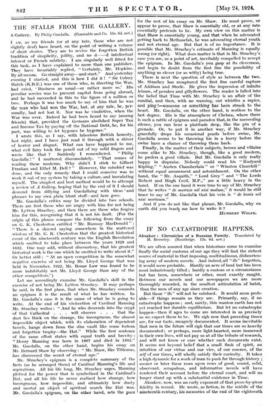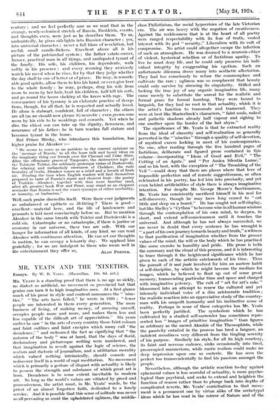IF NO CATASTROPHE HAPPENS.
WE are often assured that when historians come to examine finally the social customs of our age they will find the richest source of material in that imposing, multitudinous, dishearten- ing array of modem novels. And indeed, all "ifs" forgotten, it would seem probable. Hardly an acre of land but has been most industriously tilled ; hardly a custom or a circumstance but has been, somewhere or other, most exactly caught. Between our novels and our newspapers we are more thoroughly recorded, in the smallest articulation of habit, than the men of any age since creation.
But those " ifs " will not be subdued. It would seem prob- able—if things remain as they are. Primarily, say, if no catastrophe happens ; and, surely, this wanton earth has not yet reached her durable equilibrium. But let no catastrophe happen—then if ages to come are interested in us precisely as we expect them to be. We sigh now that preceding times are, for our taste, meagrely documented. It seems inevitable that men in the future will sigh that our times are so heavily documented ; or perhaps, more light-hearted, more immersed in their own lives, will not pay us at all the tribute of research, and will not know or care whether such documents exist. It seems not beyond belief that a small flash of spirit, an intuition of our virtue and our vice, of our essence, of the self of our times, will wholly satisfy their curiosity. It takes a high dynamic for a work of man to push far through history ; sooner or later these -rows upon rows of good, sound, solid,- observant, scrupulous, and informative novels will have rendered their account before the eternal court, and will no longer stand up with a substantial existence in Time.
Aksakov, now, was an early exponent of that piece-by-piece fidelity in record. He wrote, as fiction, in the middle of the nineteenth century, his memories of the end of the eighteenth
century ; and we feel perfectly sure as we read that in the strange, newly-colonized stretch of Russia, Bashkiria, events, and thoughts even, were just as he describes them. To as, undoubtedly, he gives sidelights into Russian character ; yes, into universal character ; never a full blaze of revelation, but useful, small candle-flickers. Excellent above all is his
picture of the patriarchal system ; the father estate-owner, farmer, practical man in all things, and undisputed tyrant of the family. His wife, his children, his dependents, walk softly in his presence ; and every morning they anxiously watch his mood 'when he rises, for by that they judge -whether the day shall be one of terror or of peace. He may, in remark- able good spirits, allow them to kiss his hand, or even give beer to the whole family ; he may, perhaps, drag his wife from room to room by her hair, beat his children, half-kill his serfs, and go round the house shaking at the knees with rage. The consequence of his tyranny is an elaborate practice of decep- tions, though, for all that, he is respected and actually loved.
He alone is stalwart, confident, full of character ; the others are all (as we should now phrase it) neurotic ; even grown sons seem by his side to be weaklings and cowards. Yet when he dies the eldest son can take up the dignity, fierceness, and assurance of his father ; he in turn reaches full stature and becomes tyrant in the home.
But Prince Mirsky, who introduces this translation, has higher praise for Aksakov :—
" He seems to come as an antidote to the current opinions on the 'message of Russia,' to all the loose talk and looser ideas on the imaginary thing our friends over the Channel call l'dtne Slave. After the effeminate graces of Turgeniev; the destructive logic of the Tolstoite Tolstoi, the sublimely grotesque vistas of Dostoievski, the relaxing and melancholy sweetness of Chekhov, the rude brutality of Gorki, Aksakov comes as a relief and a breath of fresh air. Pending the time when English readers will find themselves prepared to taste of Russia's ripest and choicest fruit--the poetry of Pushkin—Aksakov, together with that more familiar (and, after all, greater) book War and Peace, may stand as an eloquent reminder that Russia is not the exact synonym of either morbidity, or insanity, or barbarism."
Well, such praise discredits' itself. Were there ever judgments so unbalanced or epithets so ill-fitting ? There is good- excellent—material here, and the life of landowners and peasants is laid most convincingly before us. But to mention Aksakov in the same breath with Tolstoi and Dostoievski is a cold sin. Catastrophe or no catastrophe, if there is justice or economy in our universe, these two are safe. With our hunger for information of all kinds, of any kind, we can read Aksakov with continuous attention. He can set our thoughts in motion, he can occupy a leisurely day. We applaud him gratefully ; for we are indulgent to those who mean well in the entertainment they offer us.
ALAN PORTER. .











































 Previous page
Previous page